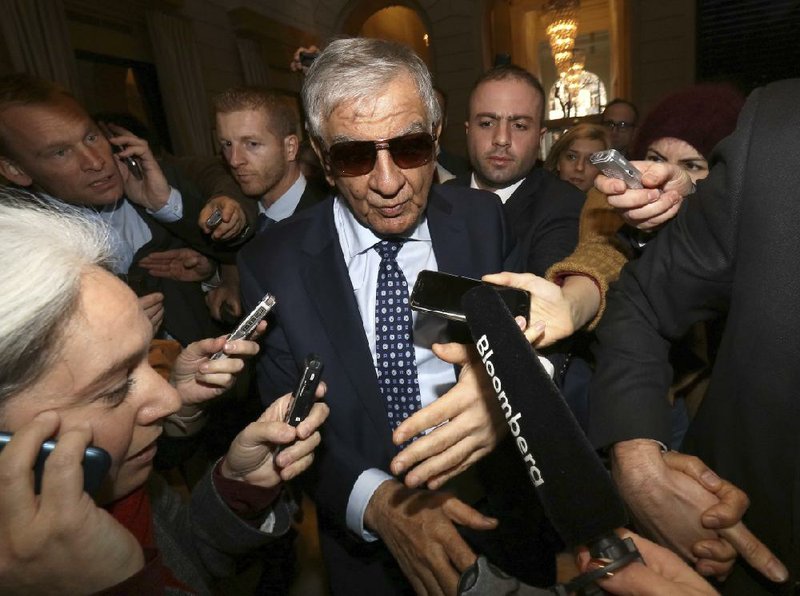OPEC ministers flew to Moscow on Monday and officials in Vienna started another round of talks in an effort to salvage an agreement on oil production cuts, just as Saudi Arabia said a deal might not be necessary.
With only two days to go before ministers from the Organization of Petroleum Exporting Countries try to finalize the first production decrease in eight years, the foundations for a deal were looking shaky. A final round of diplomacy focused on internal divisions over how to share the cuts and Russian resistance to reducing supply, which already forced the cancellation of crucial talks with non-OPEC suppliers. Khalid Al-Falih, the Saudi oil minister, for the first time on Sunday floated the possibility of leaving Vienna without an agreement.
Al-Falih's comments came two days after Saudi Arabia pulled out of a meeting with nonmembers, including Russia, arguing that OPEC needs to sort out its internal divisions before engaging with other producers. It's unclear whether the minister has changed his mind about the merits of an agreement, or is trying to improve his negotiating position with Iran and Iraq. Both nations have resisted cutting their own production, but need an OPEC deal to increase prices.
Iraqi Oil Minister Jabar Ali al-Luaibi told reporters as he arrived in Vienna that he was optimistic OPEC can reach an agreement acceptable to all members.
"Saudi Arabia and Iran are all playing very strong negotiation tactics," said Abhishek Deshpande, chief energy analyst at Natixis SA in London. "The problem for Saudi Arabia is that this isn't the 1980s and 1990s, when it could use its clout and expect others to follow. Today members like Iran and Iraq are equally strong, and their agenda is to ensure they get a large market share."
Without an OPEC cut, the International Energy Agency predicts that the oil market will remain in surplus for a fourth year in 2017, which could cause prices to fall. Brent crude rose $1 to $48.24 a barrel on the London-based ICE Futures Europe exchange.
"We expect demand to recover in 2017, then prices will stabilize, and this will happen without an intervention from OPEC," Al-Falih said in Dhahran, eastern Saudi Arabia, on Sunday, according to the Saudi newspaper Asharq al-Awsat. "We don't have a single path which is to cut production at the OPEC meeting, we can also depend on recovery in consumption, especially from the U.S."
As OPEC tries to resolve its own differences, the group is asking other big producers, including Russia, to reduce output by as much as 600,000 barrels a day. The Kremlin so far resisted OPEC's request that it joins the cut, offering instead to freeze production at its current level.
Talks in Vienna with nonmembers scheduled for Monday were canceled last week after the Saudis pulled out. A breakfast meeting with other nations that was tentatively scheduled for Wednesday morning has also been canceled, an OPEC delegate said.
"It's not beneficial to attend the meeting with producers from outside OPEC before holding meetings within OPEC and deciding whether to cut or continue with current levels of production," Al-Falih said, according to Asharq Al-Awsat.
In an unexpected move, Algerian Energy Minister Noureddine Boutarfa, one of the architects of OPEC's September accord to reduce output, and Venezuela's Eulogio Del Pino, a regular intermediary in the group's discussions, met in Algiers and then traveled to Moscow on Monday, according to two delegates familiar with the matter, who asked not to be identified as the talks are private.
In a phone call between Russian President Vladimir Putin and Iran's Hassan Rouhani on Monday, the two leaders stressed the importance of OPEC's efforts to cut supply, according to Kremlin statement. It didn't specify what actions Iran and Russia were will to take.
Instead of meeting with non-OPEC producers in Vienna Monday, officials from the group's high-level committee worked to reach agreement among themselves how much each member should cut. A similar effort last week proposed the group reduce output by 4 percent to 5 percent, but failed to resolve the question of Iran and Iraq's participation.
After several hours of discussion on Monday, the meeting hadn't reached an agreement on how to share the production cuts, according to a delegate.
Boutarfa presented Iranian Oil Minister Bijan Namdar Zanganeh with a proposal for a collective cut of 1.1 million barrels a day in Tehran on Saturday. Iran had previously said it should be allowed to continue increasing production as its exports recovered from nuclear-related sanctions that were eased in January.
Business on 11/29/2016
